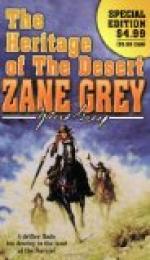The hogans where these desert savages dwelt were all alike; only the chief’s was larger. From without it resembled a mound of clay with a few white logs, half imbedded, shining against the brick red. August Naab drew aside a blanket hanging over a door, and entered, beckoning his companion to follow. Inured as Hare had become to the smell and smart of wood-smoke, for a moment he could not see, or scarcely breathe, so thick was the atmosphere. A fire, the size of which attested the desert Indian’s love of warmth, blazed in the middle of the hogan, and sent part of its smoke upward through a round hole in the roof. Eschtah, with blanket over his shoulders, his lean black head bent, sat near the fire. He noted the entrance of his visitors, but immediately resumed his meditative posture, and appeared to be unaware of their presence.
Hare followed August’s example, sitting down and speaking no word. His eyes, however, roved discreetly to and fro. Eschtah’s three wives presented great differences in age and appearance. The eldest was a wrinkled, parchment-skinned old hag who sat sightless before the fire; the next was a solid square squaw, employed in the task of combing a naked boy’s hair with a comb made of stiff thin roots tied tightly in a round bunch. Judging from the youngster’s actions and grimaces, this combing process was not a pleasant one. The third wife, much younger, had a comely face, and long braids of black hair, of which, evidently, she was proud. She leaned on her knees over a flat slab of rock, and holding in her hands a long oval stone, she rolled and mashed corn into meal. There were young braves, handsome in their bronze-skinned way, with bands binding their straight thick hair, silver rings in their ears, silver bracelets on their wrists, silver buttons on their moccasins. There were girls who looked up from their blanket-weaving with shy curiosity, and then turned to their frames strung with long threads. Under their nimble fingers the wool-carrying needles slipped in and out, and the colored stripes grew apace. Then there were younger boys and girls, all bright-eyed and curious; and babies sleeping on blankets. Where the walls and ceiling were not covered with buckskin garments, weapons and blankets, Hare saw the white wood-ribs of the hogan structure. It was a work of art, this circular house of forked logs and branches, interwoven into a dome, arched and strong, and all covered and cemented with clay.
At a touch of August’s hand Hare turned to the old chief; and awaited his speech. It came with the uplifting of Eschtah’s head, and the offering of his hand in the white man’s salute. August’s replies were slow and labored; he could not speak the Navajo language fluently, but he understood it.
“The White Prophet is welcome,” was the chief’s greeting. “Does he come for sheep or braves or to honor the Navajo in his home?”
“Eschtah, he seeks the Flower of the Desert,” replied August Naab. “Mescal has left him. Her trail leads to the bitter waters under the cliff, and then is as a bird’s.”




